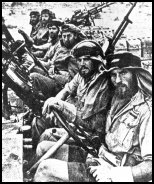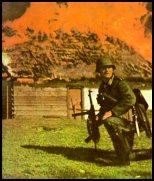
SAS troops - Western Desert |
Remembering the First Fight Against Fascism |

Another Russian Village - Another Fire |

SAS troops - Western Desert |
Remembering the First Fight Against Fascism |

Another Russian Village - Another Fire |
Hot Links: Barbarossa Map
Today: June 26, 1941
Organized Soviet resistance in the fortress town of Brest-Litovsk comes to an end after four days of extremely heavy fighting. The Germans finally pummeled the defenders into submission with massive air strikes and heavy artillery bombardment.
In Army Group North, tanks of von Manstein's 4th Panzer Group capture the Dvina River bridges at Daugavipils intact. Hitler orders these forces to stop, consolidate, gather supplies and wait for the infantry forces, far to the rear, to catch up. Many "historians" have indicated that this decision was fatal for the swift capture of Leningrad. This opinion, however, ignores the terrain on the approach, the Red army, and the appalling logistics situation for the Germans.
In Army Group Center, the 7th Panzer Division (Rommel's old unit from France) driving north of Minsk, cuts the Minsk-Moscow highway, the main supply route for the Soviet West Front. Further to the south, Guderian's 2 Panzer Group is driving hard to complete the encirclement of the Soviet forces around Minsk.
In Army Group South, the Soviets launch fresh and very strong counterattacks against the German spearheads. These attacks fall particularly hard on the 16th Panzer Division in the area around Ostrov. Further to the north, 11th Panzer Division is blocked in it's advance at Dubno. The advance of the this army group is temporarily stopped.
June 25, 1941
German troops confront the Soviet KV-I and KV-II heavy tanks in battle. The German anti-tank guns and panzers are unable to cope with these behemoths and resort to using the 88mm anti-aircraft gun and 100mm field artillery to stop the beasts. This was a very rude surprise to the Germans.
Forces of Army Group Center (3rd Panzer Group) capture Vilnius. Army Group South meets stiff opposition as the Soviet Southwest Front concentrates large tank formations in front of the advancing 1st Panzer Group. Soviet counter attacks around Grodno continue but begin to falter. In the far north, Soviet defenses stiffen around Murmansk, stopping the Germans short of their goal. The Germans would never capture the vital supply port.
Finland joins the Axis nations by declaring war on the U.S.S.R.
Sweden, although technically neutral, allows armed German troops to move through their nation on the way to Russia.
Roosevelt signs Executive Order 8802 which calls for the " Full Participation In The Defense Program By All Persons, Regardless Of Race, Creed, Color, Or National Origin" (he knew he'd need everybody's help to crush fascism). Also, the (thrice elected in an honest vote) president, declared that the Siberian port Vladivostok, would be exempt from the neutrality statutes so supplies could flow to Russia.
June 24, 1941
The Germans continue to advance in pursuit of the retreating Russian forces. In the north, the destruction of the Soviet armored reserves is completed and the German columns begin to break into the clear. In the center, Soviet resistance is shattered as German tank columns enter Vilnius. Heavy fighting is still reported in the south as German forces make marginal gains toward Kiev. The Germans gain air superiority over the front as 2000 Russian planes have now been destroyed since hostilities started.
Roosevelt orders all Soviet assets
released and promises aid to the beleaguered nation.
June 23, 1941
Hungry joins Germany, Rumania, Italy, Slovakia and Croatia by declaring war on the Soviet Union.
The relentless advance in Russia continues as shattered Soviet forces flood east pursued by the German invaders. German panzer units begin to meet Soviet tank formations rushing to the front. The Soviet columns are badly organized and depleted because of constant air attacks. On the approaches to Vilnius, German tank columns bypass pockets of resistance and drive deep into the Soviet rear areas. Further to the south, German forces are met by strong resistance and a fierce tank battle develops around Dubno.
British forces advance to Palmyra
in Syria against strong Vichy French resistance.
June 22, 1941
BARBAROSSA! The Invasion of Russia Begins
At 3:00 A.M., three million battle hardened soldiers of German Wehrmacht, struck the ill-prepared Soviet army, starting one of the single most devastating and titanic struggles in history. Three German Army Groups, North, Center and South, struck for their respective goals of Leningrad, Moscow and Kiev.
German aircraft pounded targets deep in Russia. Airfields were a primary target and by days end, 500 Soviet planes were destroyed, mostly on the ground. Russian border forces were quickly overrun after brief but vicious fights. One notable exception, the fortress of Brest-Litovsk on the Bug River, holds against ferocious German attacks. Efforts to mobilize defensive countermeasures were chaotic as reinforcing columns are harassed by constant air attacks. By days end, German ground forces advance 15-25 miles.
Hitler declared that when he unleashed his armies to the east, "The world will hold its breath". This was one of the few statements he made that was absolutely correct.
Churchill declares Britain will
assist the Soviets saying, "Any man or State who fights against Nazism
will have our aid. Any man or State who marches with Hitler is our foe."
One hopes these words would be remembered today.
June 21, 1941
Australian forces occupy Damascus after Vichy French forces withdraw.
General Wavell having utterly failed to relieve Tobruk in Operation Battleax, is sacked by Churchill as commanding officer of the Commonwealth troops in the Middle East.
Commonwealth forces enter Iraq in order to secure oil supplies for the war effort (things really never do change do they?).
Hitler signals to his eastern troops that the invasion of the Soviet Union is on for the next day.
German commandos, the Brandenburgers,
begin operations, infiltrating across the border, move to secure bridges
and other important facilities in the Russian rear area in preparation
for the invasion.
June 20, 1941
President Roosevelt calls Germany an "outlaw nation" because of the sinking of the Robin Moore by a German U-Boat on May 21.
The USS
Texas , while on a "neutrality patrol," is dogged by the German submarine
U-203 between Newfoundland
and Greenland. The German skipper thought the Texas was a lend lease vessel
and therefore fair game for his attack.